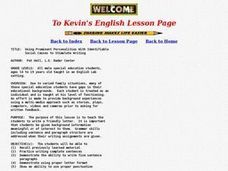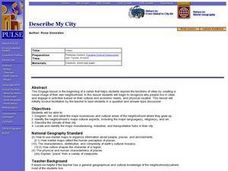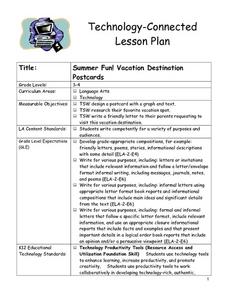Curated OER
Unscramble the Letters
Students develop their spelling skills. In this language arts lesson, students unscramble words and write sentences to accompany each of them.
Curated OER
The "Write Sport"
Fifth graders discuss the history of sports in Iowa. In this sports lesson plan, 5th graders write a friendly sports letter and a how to directional writing. They write five entries in their journal from the point of view of a piece of...
Curated OER
Autobiographical Writing
In this unique instructional activity on autobiographical writing, students compare and contrast three types of writing: narrative, poetry and newspaper. Students prepare to produce a short autobiographical writing based on the framework...
Curated OER
Hiragana - Perfect ~ Writing a Japanese Pictionary
Students listen to a story and view Japanese artifacts. They use the internet to explore the writings known as Hiragana. They create their own Japanese pictionaries and share them with the class.
Curated OER
Letters
Students read letters the could have been written by Robert E.Lee and his friend John giving students an ideas of what students from a different era thought of George Washington. They discuss history from a child's view point.
Curated OER
Learning to Give
Students design advertising posters for a snack sale. They study the concept of philanthropy and write friendly letters asking for volunteers.
Curated OER
Finding the Missing Letters and Sequencing
Students discover missing letters of the alphabet. In this letter recognition instructional activity, students identify the missing letters in a short alphabet sequence. Students complete a worksheet as an assessment.
Curated OER
"my Dear Little Boys..." Using Wwii Primary Documents: a Letter Home From the War
Students read letters written by soldiers during World War II in order to analyze the soldier's feelings about the war. They explain how these primary sources teach appreciation for the World War II soldier's experiences.
Curated OER
Using Prominent Personalities With Identifiable Social Causes to Stimulate Writing
Students write a friendly letter to a Maya Angelou, describing their response to her poetry and short stories.
Virginia Department of Education
Determining Purpose and Audience
Build the writing skills of your junior high wordsmiths with activities that introduce many essential skills of writing. As a class, they develop working definitions of formal vs. informal writing, explore different categories of...
Curated OER
Life's Greatest Pleasures
Students explore the meaning of what makes life pleasurable. In this social awareness lesson, students read an article that states things that people might enjoy doing for pleasure, then complete numerous activities to reinforce what...
Curated OER
Frosty the Snowman Meets His Demise: An Analogy to Carbon Dating
Students read and discuss an article about carbon dating, then participate in a hands-on lab to discover how carbon dating works. Students also write a letter to a friend explaining the process, and how archeologists use the process to...
Curated OER
Describe My City
Students explore the functions of cities by creating a visual image of their own neighborhood. Students diagram, list, and label the major businesses and cultural areas of the neighborhood where they grew up, then write a letter to a...
Curated OER
Getting Here from There
Students role-play early 20th century immigrants on their way to Indiana. They consider the methods of travel available to them and write a letter to a friend outlining their travel plans and adventures during the trip.
Virginia Department of Education
Deciding the Mode
Are your young writers having difficulty distinguishing between expository and persuasive writing? Discuss the difference between the two, and how some prompts can be responded to in either fashion. Included here is a simple lesson plan...
Curated OER
Our Picture and Word Book
Create a fun song for your young learners! It should include each of their names and use rhyme to make it memorable. Then show the class a picture dictionary, and have learners make their own class dictionary! If you have time, consider...
Council for Economic Education
Satisfaction Please! (Part 1)
The topic of consumerism seems easy to those who participate actively in the US economy, but pupils who are new to economics may see the idea as foreign. Help them understand their rights as consumers and what to expect when interacting...
Curated OER
Aesop's Fables
Examine the fables of Aesop with your class. Pupils identify the morals of fables and role-play a scene from their favorite fable of Aesop. Additionally, they compose letters to a favorite character in the fable. Learners role-play again...
Curated OER
Summer Fun! Vacation Destination Postcards
Students design a postcard with a graph and text. They research their favorite vacation spot. Pupils write a friendly letter to their parents requesting to visit this vacation destination. Students use a Circle Map, to help fill in their...
Curated OER
A Stinking Smelly Sewer
Students create a timeline of events that occurred in the Nashua River Valley as presented in the book, "A River Ran Wild." They write a description of a selected time period on an index card for a class timeline, and write a letter to...
Curated OER
Time for All Ages
Fourth graders discover time keeping by analyzing technological advances in history. In this time lesson, 4th graders create and complete a KWL chart based on their research of a famous timekeeping invention, such as a sundial....
Curated OER
First Day of School: I'll Get to Know You
Students participate in a letter matching game that pairs students so that they can introduce a new friend. They listen to the Shel Silverstein book, The Giving Tree and write a letter to the class telling them what they will give to the...
Curated OER
Folk Tales Thematic Unit
Second graders read different folk tales and discuss them. They are given a template of a letter and they are to write a friendly letter. Special education students are paired with advanced students to help them.
Curated OER
Van Gogh's Self-Portraits
Students examine Vincent van Gogh's self-portraits and letters. They consider how first-person art forms aid the process of self-discovery. They produce a Van Gogh-style self-portrait and write a letter describing it

























